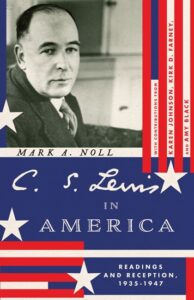Are there ideas in a book that the author didn’t intend?
I asked this in an earlier post regarding interpreting the biblical authors. It’s important for understanding the Bible or any piece of literature. C. S. Lewis once weighed in on this very question.
 In 1944 Charles Brady wrote a review of Lewis’s output up to that point, including the first installment of Lewis’s Space Trilogy, Out of the Silent Planet. Brady commented on the scene when the main character, Elwin Ransom, first encounters a race of intelligent beings from Mars, the Hrossa. This, Brady thought, could “be interpreted . . . as an allegory of racial fear and repugnance.”
In 1944 Charles Brady wrote a review of Lewis’s output up to that point, including the first installment of Lewis’s Space Trilogy, Out of the Silent Planet. Brady commented on the scene when the main character, Elwin Ransom, first encounters a race of intelligent beings from Mars, the Hrossa. This, Brady thought, could “be interpreted . . . as an allegory of racial fear and repugnance.”
Lewis wrote to Brady a few months later, thanking him for the overall positive review, and in the process made this insightful response: “When you talk about meetings of human races in connexion [sic] with Ransom and the Hrossa you say something that was not in my mind at all. So much the better: a book’s not worth writing unless it suggests more than the author intended.”*
 Even though Lewis didn’t mean to say something about racial encounters generally (something that still concerns us today), nonetheless, he was happy to acknowledge that sometimes books take on a life of their own. Lewis seems to imply that that is the whole point of writing a book—that it be subtle, complex, evocative, and carry more ideas than the author even consciously anticipated.
Even though Lewis didn’t mean to say something about racial encounters generally (something that still concerns us today), nonetheless, he was happy to acknowledge that sometimes books take on a life of their own. Lewis seems to imply that that is the whole point of writing a book—that it be subtle, complex, evocative, and carry more ideas than the author even consciously anticipated.
That is what makes for great writing. If all the meaning is on the surface, it won’t stand the test of time. But a book with layers and depth can become something worth pondering for generations.
—
*These two quotes are from Mark Noll, C. S. Lewis in America (Downers Grove, IL: IVP Academic, 2023), chapter one: Charles A. Brady, “C. S. Lewis: II,” America, June 10, 1944, 269; and C. S. Lewis to Charles A. Brady, October 29, 1944, in Books, Broadcasts, and the War, 1931–1949 , vol. 2 of The Collected Letters of C. S. Lewis, ed. Walter Hooper (San Francisco: HarperSanFrancisco, 2004), 630.

today is the birthday of C.S. Lewis, born 1898.
That’s remarkable, Max. I didn’t know that! Thank you.